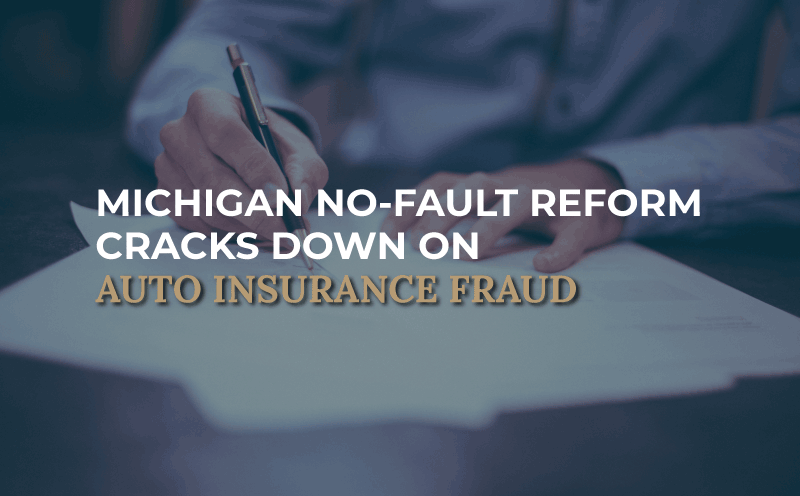Does Michigan No-Fault Reform Actually Crack Down on Auto Insurance Fraud?

One of the objectives of Michigan’s recent auto no-fault reform was to supposedly crack down on auto insurance fraud. Proponents of these reforms claimed auto insurance fraud was one of the main drivers of high auto insurance premiums in Michigan. However, upon analyzing the new legislation, it’s apparent that the new, stricter rules regarding auto insurance fraud only really apply to consumers and not fraudulent insurance carriers. Lansing car crash lawyer, Stephen Sinas, recently appeared on WLAJ 53 “In the Name of the Law” to discuss instances of fraud in the auto insurance industry, the laws in favor of insurance companies against fraud, and the lackluster consumer protections in Michigan.
Auto Insurance Fraud in Michigan
Fraud is an issue in Michigan’s auto insurance industry. Most often, consumers committed auto insurance fraud during the purchasing phase or the benefit claims process.
Upon analyzing the new legislation, it's apparent that the new, stricter rules regarding auto insurance fraud only really apply to consumers and not fraudulent insurance carriers.
Consumer Misrepresentation When Purchasing Auto Insurance
When you purchase auto insurance, your insurer asks a variety of questions, including who all lives in your home, where the vehicles are garaged, how and when you use your vehicle, and other similar inquiries. When answering these questions, if the consumer misrepresents any information, the insurance company can accuse you of committing fraud. Later, in the unfortunate event that you have to claim benefits following an auto accident, your insurer can look back at the answers you provided during the insurance purchasing process and deny payment of benefits if any of this information was in any way inaccurate or misrepresented.
Our firm has consulted with injured motor vehicle victims who thought they were entitled to auto no-fault benefits. But, upon looking into their policy and the information they provided during the purchasing process, they find themselves with a voided policy and no payable benefits. Most often, people do not even realize they don’t have coverage until after they were injured in a collision.
It’s important to accurately represent all information. It might be tempting to provide only certain information, but this misinformation comes with dire consequences.
Lansing personal injury attorney, Stephen Sinas, describes the crackdown on auto insurance fraud on WLAJ “In the Name of the Law”
Misrepresentation When Claiming Benefits Under an Auto Insurance Policy
In instances of injuries resulting from automobile accidents, claimants will have to submit a variety of materials, documentation, and resources to their insurer. If any information is inaccurate or misrepresented, the insurer can deny payment of those benefits. Furthermore, misrepresentation of insurance information also opens the claimant up to penalties.
It’s important to remember that Michigan’s unique no-fault benefits can be life-changing to those catastrophically injured, and risking denial of these benefits is simply not worth it. Auto no-fault benefits include:
Penalties for Committing Auto Insurance Fraud
Under our state’s auto no-fault system, auto insurance companies can legally deny fraudulent claims as well as seek payment of their attorney fees accrued in their defense case. Over recent years, a string of Appellate decisions is allowing insurance companies to assess stricter penalties on those committing auto insurance fraud. As a result, if your auto insurance policy contains certain language and clauses, your insurer can not only deny payments of fraudulent claims but void the insurance policy altogether. This means that a person catastrophically injured in a motor vehicle collision will no longer have access to lifetime medical expense benefits.
Fraud Exclusions Do Not Apply to Non-Parties to the Policy
The Supreme Court recently issued a decision in the case of Meemic vs. Fordson determining that fraud exclusions don’t extend to people who aren’t actually parties to the policy. People claiming benefits, such as children, for example, would not be subject to such strict fraud exclusions. On the other hand, this decision still left the question unanswered as to whether or not insurers can exclude policyholders themselves based on fraud. Until the Supreme Court provides further clarity on this issue, it is likely insurers will continue denying claims based on insurance fraud against policyholders.
Criminal Prosecution of Auto Insurance Fraud
One outcome of the Michigan auto no-fault reform of 2019 was the creation of the anti-insurance fraud unit as part of the Attorney General’s office. The anti-insurance fraud unit investigates and criminally prosecutes individuals guilty of committing auto insurance fraud. The anti-fraud unit is funded and now has more resources than ever to investigate instances of fraud. However, one issue the no-fault reform did not address was providing stricter consumer protections against fraudulent insurance company practices. Michigan’s consumer laws for holding insurance companies liable for mistreating people are lackluster at best. In short, Michigan consumers didn’t get anything in terms of holding fraudulent insurance companies liable as the result of the no-fault reform, whereas insurance companies gained more power to prosecute consumers criminally for fraud.
THE BOTTOM LINE
Michigan’s recent no-fault reform may ultimately really only provide a one-sided “crackdown” on auto insurance reform, unfairly impacting Michigan auto accident survivors.

